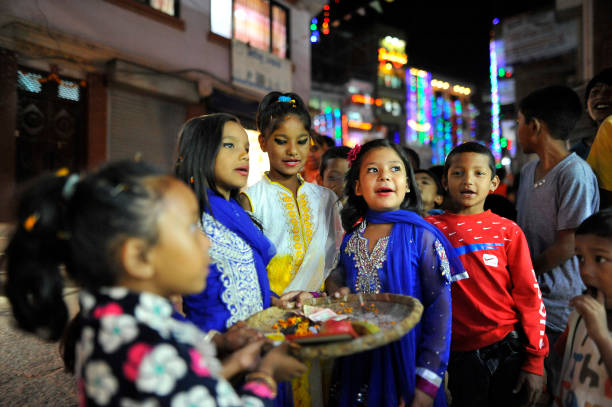Happy Diwali! In recent month, some of us have felt a shift in how the world works, how it all hangs together. It seems that things which would have shattered our worlds two years ago are some kind of new normal now. Two years ago, a massacre like the one in Las Vegas would have been front page news for weeks. Not anymore. Before we have time to digest it, the next thing happens. It feels like we’ve opened up a Pandora’s box, and now we can’t go back. The end result is that the world feels more angry, more dark and just nasty. Reprieves from that stark reality are always welcome, but now more than ever the bright spots feel more important to celebrate. For that reason, this year’s Diwali celebration has taken on a whole new level of poignancy. We need this celebration right now.
Living the Spirit of Diwali
A Festival with a Message
The celebration of Diwali originated in ancient India, where it started as a summer harvest festival. With time, it has become a festival of light, and is celebrated across the world. Today, it an official holiday in many countries, such as Fiji, Trinidad and Tobago, Myanmar, Guyana, Malaysia, Nepal and Singapore. In India, it is the biggest and most popular celebration of the year. While it may have begun as a Hindu religious feast, it has long since transcended religious barriers, and is now celebrated within other religions (e.g. Sikhism, Jainism, and Buddhism), as well as a profane cultural festival. The word diwali means “row of lighted lamps”. The light symbolizes the victory of light over darkness. Diwali spiritually signifies the triumph of good over evil, prosperity over poverty, knowledge over ignorance and hope over despair. The spirit of Diwali is truly universal.
The Spirit of Diwali
Perhaps Diwali is the optimal time of year to start practicing what you preach, if you haven’t done so already. Here’s a simple example: We all know how it is that your football team has an arch-rival. The Cincinnati Bengals have the Cleveland Browns, and the New York Jets have the New England Patriots and so on. Your hockey team has one, too (Edmonton Oilers vs. Calgary Flames, let’s say). So does your soccer team, and so on. Your player gets injured, their fans (or players) express joy. Recently, a top Swedish goalkeeper passed away. His rival team’s fans gleefully authored a chant celebrating his death. Not only is it cruel to joke about his children not having a father. It’s ignorant, lacks respect for human life, and it shows a lack of empathy. Empathy develops in toddlerhood, so it’s also a sign of immaturity. All those things run contrary to the spirit of Diwali.
Let the Light Shine Through
Living the spirit of Diwali is when you can look back at yourself in the mirror and know you’ve helped good win over bad. When the deathly ill son of a coach from a Swedish hockey team needed stem cells, fans from the team’s arch-rivals’ made a public plea for fans from their own club to sign up to become donors. For someone whose child is so deathly ill, a simple act of kindness can be the difference between despair and hope. Those fans showed grace, humility and empathy. Their actions embodied the spirit of Diwali. If you’re a Packer Backer and you could save a deathly ill child, does it matter if his dad coaches the Chicago Bears? Not really, right? Of course, it’s about empathy and good sportsmanship. It’s also about letting the light shine through, and about walking the walk.
Be the better Person
When was the last time you actively encouraged your child to play with someone who was disabled? In the modern era, Diwali is also about inclusion. There are so many instances in your day when small actions could change the world if we all did them. Simple little things, like never calling someone a name again. Using positive language instead of negative. Trying constructive criticism instead of heaping four-letter words on a co-worker. Simply think before you speak. When someone asks “does Aaron Rodgers’ injury change the conference”, how about you think? The right answer should never be “F— Aaron Rodgers”. Why? Because you’re better than that. If you can be the better person, why not simply be the better person? Be a leader worthy of emulating. If we all did that, together, we could move mountains. We could heal sick children, and it wouldn’t matter whose children they were.
Brightness in a Dark World
Traditionally, Diwali is celebrated by lighting millions of lights. In India, colourful rangolis are laid out. In Canada, we set off fireworks, dance, and exchange sweets and gifts. The festival preparations and rituals usually last five days. On Diwali night (typically mid-October to early November) observers dress up in their best clothes, light oil lamps (diyas) and candles. Those who are religious pray with their families, while others spend time with loves ones or in quiet contemplation. This is followed by fireworks, a meal and a gift exchange. Part of the modern message behind this ancient celebration is inclusiveness. The idea is to break cultural barriers and include everyone in the community in the festivities. This year, however, let Diwali be a new beginning. Diwali can be the kick-off point for a new way to fight against the overwhelming feeling of an angry world.
Main Image:

